|
|
|
Sort Order |
|
|
|
Items / Page
|
|
|
|
|
|
|
| Srl | Item |
| 1 |
ID:
113758
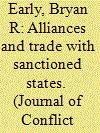

|
|
|
|
|
| Publication |
2012.
|
| Summary/Abstract |
What determines how US economic sanctions affect the international trade conducted with their targets? This article develops a liberal-based explanation for why economic sanctions increase their targets' trade with some third parties and decrease it with others. It is theorized that the effects of defense pact alliances between sender and third-party states are conditional upon the strength of the third parties' commercial dependence upon the target states. Third parties will cooperate with senders when the costs are low, but use their alliance relationships as cover to sanctions bust when the commercial benefits are high. This suggests that the United States can best gain the support of allies whose cooperation matters the least, while the allies whose support is most important tend to sanctions bust. It is also theorized that a target state's allies trade more with it than its nonallies. An empirical analysis of ninety-six episodes of US-imposed sanctions supports these hypotheses.
|
|
|
|
|
|
|
|
|
|
|
|
|
|
|
|
| 2 |
ID:
113751
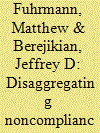

|
|
|
|
|
| Publication |
2012.
|
| Summary/Abstract |
Why do states make disingenuous treaty commitments? Under what conditions will countries refrain from entering cooperative agreements with which they do not expect to comply? This article addresses these questions by analyzing how states that are pursuing nuclear weapons treat the nuclear Nonproliferation Treaty (NPT). The authors develop a distinction between two types of noncooperative behavior. The first is cheating while part of the NPT (predation) and the second is pursuing nuclear weapons outside of the treaty (abstention). The authors' argument is that democratic proliferators are more likely to abstain because executives in democracies are domestically constrained to a greater degree than authoritarian leaders. Statistical tests in a sample of all countries with active nuclear weapons programs from 1968 to 2004 provide evidence in favor of our argument. Controlling for confounding variables and the factors that motivate states to pursue nuclear weapons, the results show that states with greater constraints on executive authority are less likely to choose predation. Yet, electoral mandates do not appear to dissuade governments from making disingenuous treaty commitments. These findings have important implications for nuclear proliferation, the credibility of international commitments, and efforts to link domestic political institutions with international outcomes.
|
|
|
|
|
|
|
|
|
|
|
|
|
|
|
|
| 3 |
ID:
113757
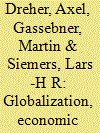

|
|
|
|
|
| Publication |
2012.
|
| Summary/Abstract |
Using the KOF Index of Globalization and two indices of economic freedom, the authors empirically analyze whether globalization and economic liberalization affect governments' respect for human rights in a panel of 106 countries over the 1981-2004 period. According to their results, physical integrity rights significantly and robustly increase with globalization and economic freedom, while empowerment rights are not robustly affected. Due to the lack of consensus about the appropriate level of empowerment rights as compared to the outright rejection of any violation of physical integrity rights, the global community is presumably less effective in promoting empowerment rights.
|
|
|
|
|
|
|
|
|
|
|
|
|
|
|
|
| 4 |
ID:
113755


|
|
|
|
|
| Publication |
2012.
|
| Summary/Abstract |
The systemic offense-defense theory argues that the security dilemma and the risk of war become doubly severe in offense-dominant eras in the state system. However, the theory assumes in support of its main argument that wars are shorter when offense has the advantage. This article empirically tests the expected connection between the systemic offense-defense balance and war duration. A statistical analysis of wars 1817-1992 disconfirms the theory's expectations. The article then draws different conclusions about the severity of the security dilemma when offense is dominant: both arms racing and the fear of aggression that the security dilemma thrives on should be less severe than offense-defense theorists assume.
|
|
|
|
|
|
|
|
|
|
|
|
|
|
|
|
| 5 |
ID:
113754
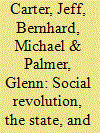

|
|
|
|
|
| Publication |
2012.
|
| Summary/Abstract |
Democracy has been the primary focus of our efforts to understand the impact of domestic institutions on processes of international conflict. In this article, we examine how a particular nondemocratic regime type, postrevolutionary states, affects military capabilities and war outcomes. Drawing on scholarship that conceptualizes revolutions as a unique class of modernizing events that result in stronger state structures, we argue that postrevolutionary states should be better able to mobilize populations and economic resources for military purposes. Tests performed on a comprehensive sample of twentieth-century states and interstate wars confirm our predictions: postrevolutionary states have larger, better funded militaries and achieve more successful war outcomes.
|
|
|
|
|
|
|
|
|
|
|
|
|
|
|
|
| 6 |
ID:
113756
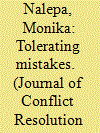

|
|
|
|
|
| Publication |
2012.
|
| Summary/Abstract |
How do perceptions of procedural fairness shape the preferences that citizens have for transitional justice (TJ) in postauthoritarian countries? This article uses original opinion poll data collected in Poland, Hungary, and the Czech Republic to investigate this question. It shows that differences in the demand for TJ are explained by how citizens perceive whether the TJ process commits errors-that is, whether the innocent are condemned (falsely convicted) or the guilty are exonerated (falsely acquitted). This is so even after accounting for threat perceptions of former autocrats and voting behavior. After comparing the ways in which citizens' perceptions of errors in the TJ process shape their demand for lustration in the three postcommunist countries, the author discusses the implications of these findings for scholars of democratic consolidation, social psychologists, and policy makers designing TJ systems.
|
|
|
|
|
|
|
|
|
|
|
|
|
|
|
|
| 7 |
ID:
113752


|
|
|
|
|
| Publication |
2012.
|
| Summary/Abstract |
The "proximate casualties" hypothesis holds that popular support for American wars is undermined more by the deaths of American personnel from nearby areas than by the deaths of those from far away. However, no previous research has tested the mechanisms that might produce this effect. This omission contributes to three areas of lingering uncertainty within the war support literature: whether national or local losses have a greater effect on war support, whether the negative effects of war deaths are durable or temporary, and whether the negative effects of war deaths have a greater influence on the most or least attentive citizens. Analysis of Iraq War data shows that local losses have a greater effect on war support than national losses, that these casualty effects decay rapidly, and that citizens who closely follow news at the national and local levels are least affected by new information about war costs. These findings run contrary to the prevailing cost-benefit calculus model of war support.
|
|
|
|
|
|
|
|
|
|
|
|
|
|
|
|
| 8 |
ID:
113753
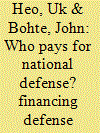

|
|
|
|
|
| Publication |
2012.
|
| Summary/Abstract |
Past studies on military expenditures in the United States have primarily focused on the extent to which guns versus butter trade-offs are prevalent without examining this relationship in the context of how other fiscal policy tools are used to pay for defense. Using annual data from 1947-2007, this study examines the relative importance of defense financing policy measures, such as guns versus butter trade-offs, tax increases, and deficit spending in paying for defense. The results show evidence of guns versus butter trade-off during the Reagan Era, but not during other periods. Both federal tax policy and deficit spending have played influential roles in funding defense spending during peacetime. This modeling strategy points to the importance of analyzing the effects of multiple fiscal policy tools when studying the forces that drive military spending in the United States since World War II.
|
|
|
|
|
|
|
|
|
|
|
|
|
|
|
|
|
|
|
|
|